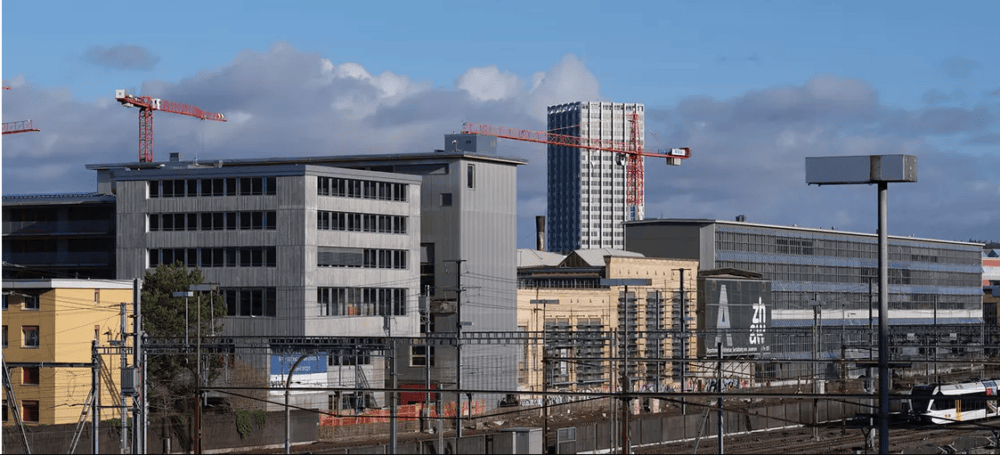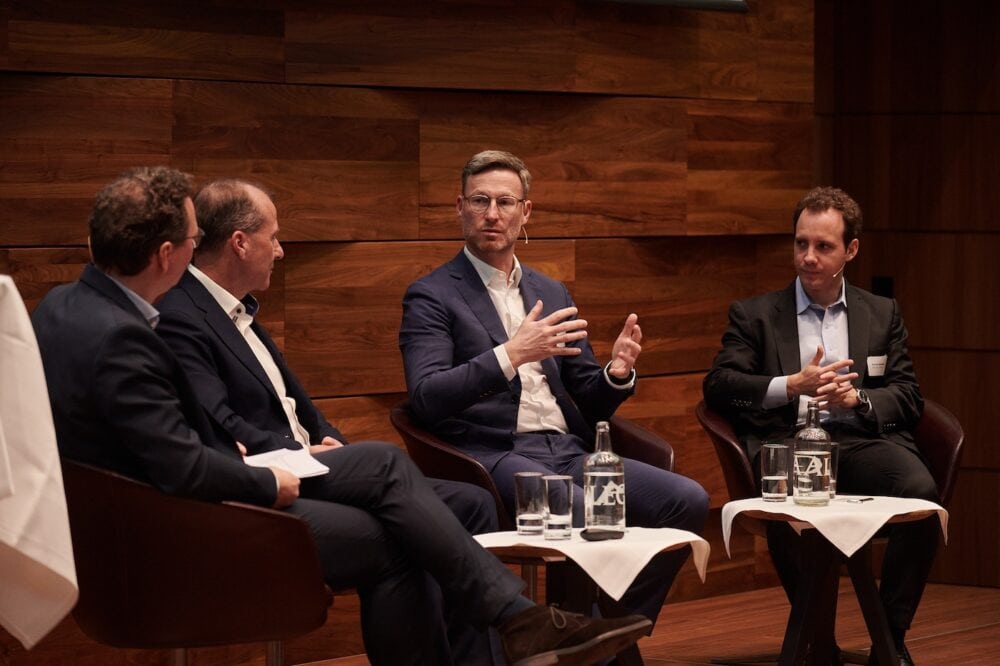Review 82nd Swiss Real Estate Talk: "All digital or what?"
Around 70 participants attended the latest Swiss Real Estate Talk at the Metropol restaurant in Zurich and heard from three top-class speakers on the state of digitalisation in the construction and real estate industry.

"The past few months have been a crash course in digitalisation for many companies and employees," said moderator Markus Schmidiger (HSLU) at the start of the 82nd Swiss Real Estate Talk, which took a closer look at the digital real estate world from various angles. Currently, many processes within companies and in customer contact are being made more efficient and simpler - be it the digital rental contract, the management of assets or the entire construction documentation. The planning, construction, marketing and operation of real estate have not just changed recently - and the changes continue to progress.
"People are becoming more important again"
In his presentation, Markus Mettler, CEO of Halter AG, outlined what digitalization has primarily triggered at the Halter Group companies: "We are convinced that we can achieve success much more effectively and collaboratively with new tools and processes," he said. Today, he said, there is much more holistic thinking in project development and construction than in the past. The key element is the "integration of planning, construction and operation", for example when the industrial prefabrication of the components and the construction logistics are already designed during the planning of a new property and at the same time the foundation is also laid for the CO2 targets to be achieved later during operation or tenants and owners can benefit in everyday life from practical and intuitively operable digital tools.
"However, digitalization is increasingly bringing a different mindset to companies in the construction and real estate industry," Mettler noted. This begins with the rediscovery of the central importance of leadership and extends to the elimination of routine processes in everyday work. "In the end, people become more important again. Thanks to the use of technology, employees can concentrate on the essentials and become more creative again," says Mettler. Furthermore, thanks to digitization, planning and construction would become significantly cheaper - Mettler sees savings potential of up to 50 percent here thanks to the avoidance of over- and under-qualities and idle time as well as new design, engineering and manufacturing technologies in conjunction with correspondingly optimized processes.
Data sovereignty and ESG criteria
Roger Krieg, founder of Office Lab and managing director of the consulting firm Alpha IC in Switzerland, emphasized that thanks to digitalization, many things can now be thought of from the end customer's perspective. This makes the work of the real estate manager much easier. The needs of the user, for example in an office or commercial property, can now be processed and served much more quickly. With regard to facility management, he asked the legitimate question of whether tenders for building services still had to be handled as they were 30 years ago.
With the digitalization of the building stock, paradigms are gradually being "broken down". Many things are being questioned and innovative solutions are in demand. He sees two important topics in the context of advancing digitalization: One concerns data sovereignty, especially when it comes to the figures and statistics from building operation, which are collected by sensors, for example. The other important issue, he said, is sustainability and with it compliance with ESG criteria. "This must and will be 'basic' in the future," says Krieg.
Links according to the Lego principle
Stefan Zanetti, founder and CEO of Allthings, then pleaded for more cooperation in the industry and thinking in ecosystems. An important point here is the interface capability of the many digital solutions. He illustrated this with the image of Lego bricks. These had standardised studs. The legitimate expectation of the real estate industry must be that PropTech applications and, above all, systems from older providers can be "simply plugged together" just like these bricks. This "Legoization," Zanetti said, must be based on open, documented APIs (application programming interfaces) - rather than tactical operation in closed systems. "The next stage of digitization can only be ignited with these connections."
For Zanetti, thinking in ecosystems is the decisive factor in helping digitalization to make a breakthrough. That's why he and his team at Allthings are now moving on to the next stage of development: from the established tenant platform to a "Digital Operators Platform", which is implemented on a customer-specific basis with openly designed additional software partners. In the process, he could also imagine, for example, a seal for tested and open-API-based PropTech applications. "We want to see a different real estate industry in 2025. And this also includes that all players in the must be able to describe and expose their APIs," says Zanetti.
Are we all becoming PropTech?
In the following discussion round moderated by Markus Schmidiger, all three speakers agreed that the "old" construction and real estate industry was still blocking new startup solutions in too many areas. Mettler noted, however, that there was currently "extreme dynamism" at every level in the real estate industry. Things are moving "extremely fast" now with digital progress, he said. Krieg interjected that many of the established firms are wary of being "first movers." He expressed understanding for the fact that they would prefer to wait for developments first and then opt for products and solutions that would also prove themselves on the market in the long term.
Another difficulty is the now almost unmanageable and daily increasing number of PropTech companies, Krieg said. The panelists agreed that there would certainly be a shakeout effect soon. Hybrid models between the young and old firms, as well as new collaborations between the "old economy" and the "new economy," will become even more prevalent, they said. When asked how proptech companies cooperate with established companies, he asked back heretically: "In the long term, do we really still need the distinction between proptech and established companies? Won't it also be the case in the real estate industry that all companies will either become true tech companies - or die?"
- Presentation Roger Krieg - Alpha IC Switzerland
- Presentation Markus Mettler - Holder
- Presentation Stefan Zanetti - Allthings
The upcoming 83rd Swiss Real Estate Meeting will take place on 21 September 2021.









